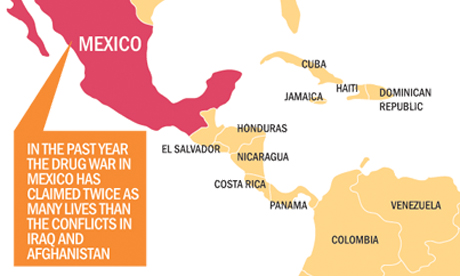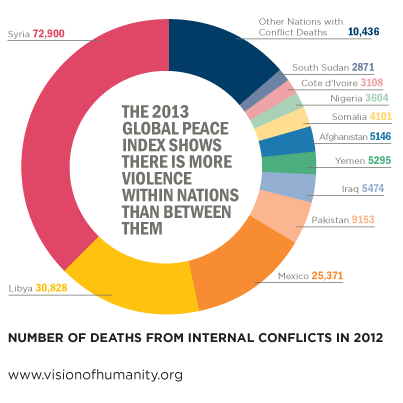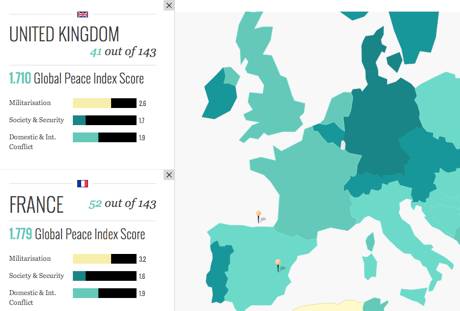Has The World Turned Less Peaceful?
By Countercurrents.org
15 June, 2013
Countercurrents.org
The world has become a less peaceful place, according to the Institute for Economics and Peace. The institute's this year's report reinforces a longer term pattern: Since 2008 levels of peace have fallen by 5%.
The annual Global Peace Index 2013 report ranks 162 countries by measuring security in society, the extent of conflict and the degree of militarization, and shows the way world peace has changed over time.
Citing the report Mona Chalabi writes * :
The findings are not altogether bleak. While the number and intensity of internal conflicts has risen in recent years, hostility between states has fallen. Overall, they found that 110 states have become less peaceful and that 48 have become more so.

This year's results suggest that the threats to peace are more likely to be found at home than abroad. Image: Institute for Economics and Peace
The report said:
Despite financial turmoil in recent years, Iceland has topped the list. Largely, the factors include political stability, low homicide rate and small prison population in Iceland .
The top of the list was littered with Western European nations that have long been peaceful; Denmark , Austria , Switzerland , Finland , Sweden and Belgium all made it to the top 10. In 6th place, with stringent laws on possession of firearms and good neighborly relations, is Japan .
At the other extreme, Afghanistan continues to languish in 162nd position despite the drop in the number of people killed as a result of internal conflict, refugees and displaced people. The country fared particularly badly on the 'political terror scale' - an indicator that uses Amnesty International and the US Department of State's Country Reports on Human Rights Practices to evaluate levels of political violence and terror.
The report said:
Somalia narrowly beat Syria to 161st place. Other countries that were considered amongst the most violent and unstable were Iraq , Sudan , Pakistan and, less frequently cited, Russia . Several of these countries were characterized by high levels of bloodshed within their territories.

Image: Institute for Economics and Peace
Citing the report Mona Chalabi writes:
This year is the seventh that the GPI have been produced. Syria stands apart as the most radically changed country during that time with a score that has plummeted by 70% since 2008. Côte d'Ivoire which has experienced heightened violence since its president was ousted from power, as well as Burkina Faso , where the army has gone on a series of destructive rampages, have seen severe deteriorations in peacefulness.
Meanwhile, Libya has moved up three places in the global rankings as the tumult of the revolution is beginning to subside. Chad also continues to witness improvements after the end of its civil war in 2010, and has moved up four places as a result.
Image: Institute for Economics and Peace.
The report said:
Over the past five years UN peacekeeping contributions have increased and the number of homicides per 100,000 people has fallen dramatically. However small arms and light weapons have become more accessible and the capability of nuclear and heavy weapons has continued to grow, suggesting that many countries remain unwilling to demilitarize.
Citing the report Mona Chalabi mentions the cost of violence to the global economy:
The amounts are far from trivial. The economic impact of containing violence cost $9.46 trillion in 2012, equivalent to 11% of global GDP.
The report added:
Were the world to reduce its expenditure on violence by approximately 50 percent it could repay the debt of the developing world ($4076bn), provide enough money for the European stability mechanism, ($900bn) and fund the additional amount required to achieve the annual cost of the Millennium Development Goals.
Mona's conclusion says:
It seems that while patterns of peace continue to shift around the world, the key trend is one where the biggest threats exist within, rather than outside, a country's borders. Despite that, most countries appear unwilling to relinquish their capabilities to combat violence from abroad.
* guardian.co.uk, June 11, 2013,
http://www.guardian.co.uk/news/datablog/2013/jun/11/global-peace-index-2013
Comments are moderated



